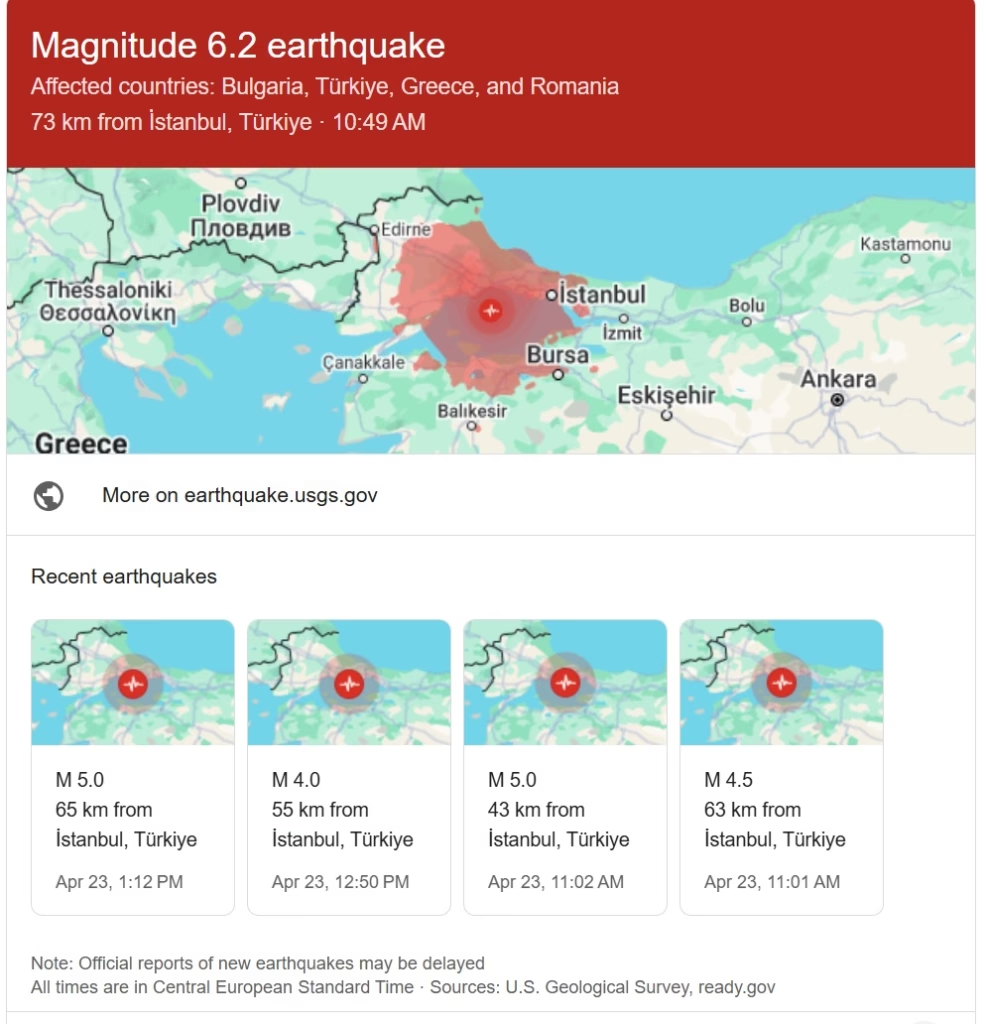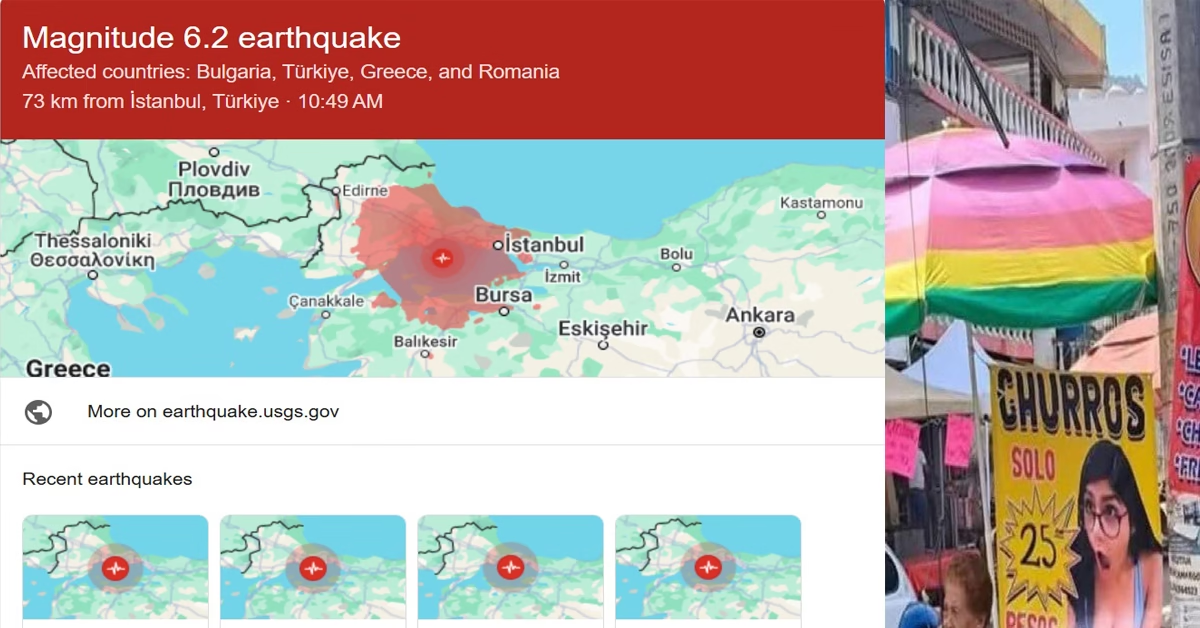Istanbul, a city that bridges Europe and Asia, is not only a historical and cultural gem but also one of the most earthquake-prone cities in the world. With over 16 million residents and centuries of architectural heritage, the threat of a major earthquake in Istanbul is not a question of if, but when. In this article, we delve deep into the seismic risks that face Istanbul, the lessons learned from past quakes, and what residents and tourists alike can do to stay safe.
1. A Geographical Time Bomb: Why Istanbul is Prone to Earthquakes
The North Anatolian Fault Line (NAF)
The biggest culprit behind Istanbul’s vulnerability is the North Anatolian Fault Line, a major active fault stretching about 1,500 km across northern Turkey. It’s the Turkish equivalent of California’s San Andreas Fault. This fault has been responsible for some of the most devastating earthquakes in Turkish history.
Istanbul’s Position
Istanbul lies just 20 kilometers north of the western end of the fault line, putting it dangerously close to future seismic activity. This proximity, combined with dense population and outdated infrastructure in some areas, makes the city extremely vulnerable.
2. A Look Back: Major Earthquakes That Shook Istanbul
The 1999 İzmit Earthquake (Magnitude 7.6)
Though centered in İzmit, about 100 km east of Istanbul, this quake caused massive damage in the city. Over 17,000 people died, and many buildings in Istanbul suffered damage.
- Date: August 17, 1999
- Magnitude: 7.6
- Casualties: 17,000+
- Lessons learned: Building codes were revised, and public awareness increased dramatically.
Historical Earthquakes
Istanbul’s history is riddled with major quakes:
- 1509 “The Lesser Doomsday”: Estimated magnitude 7.2, killing thousands and leveling parts of the city.
- 1766 Earthquake: Severely damaged mosques and palaces in Istanbul.
3. Seismic Studies: When Will the Next Big One Hit?
Seismologists warn that the next major Istanbul earthquake is overdue. According to recent studies, there is a 65% probability of a magnitude 7+ earthquake occurring in the next 30 years.
Recent Studies and Findings
- Boğaziçi University Kandilli Observatory and international experts predict a quake similar to or stronger than the 1999 İzmit quake.
- The “Marmara segment” of the NAF is considered locked and loaded.
4. The Potential Impact of a Major Istanbul Earthquake
Human Toll
- Estimated deaths: 50,000 – 100,000 (depending on the time and day)
- Injuries: Over 500,000 possible
- Homelessness: Up to 4 million people could be displaced
Economic Damage
- Estimated costs: Over $100 billion
- Destruction of critical infrastructure like bridges, tunnels, and historical monuments
- Major disruptions in commerce, tourism, and transportation
5. Is Istanbul Ready for the Next Big One?
Government Actions
- Urban Transformation Projects: Thousands of old buildings have been demolished and rebuilt to earthquake-resistant standards.
- Istanbul Seismic Risk Mitigation and Emergency Preparedness Project (ISMEP): A $1.4 billion initiative funded by the World Bank.
- Public earthquake drills and early warning systems are now more common.
Building Codes and Inspections
- Post-1999, building codes were upgraded.
- However, enforcement remains inconsistent, especially in suburban and unauthorized developments.
Community Preparedness
- AFAD (Disaster and Emergency Management Presidency) conducts drills and awareness campaigns.
- Mobile apps like Deprem Bilgi Sistemi provide real-time alerts.
6. What Can You Do to Prepare for an Earthquake in Istanbul?
Whether you’re a resident, an expat, or a tourist, knowing how to prepare can be life-saving.
Before the Quake
- Identify safe spots in each room (under tables, next to walls).
- Prepare an emergency kit: food, water, flashlight, power bank, and first-aid supplies.
- Learn the “Drop, Cover, and Hold On” method.
During the Quake
- Don’t run outside unless it’s safe.
- Stay away from windows and shelves.
- Use your arms to protect your head and neck.
After the Quake
- Check for injuries and hazards (gas leaks, broken glass).
- Use text messages to communicate (lines may be jammed).
- Follow updates from official sources like AFAD and Kandilli Observatory.
7. Earthquake Insurance in Turkey: What You Need to Know
Turkey mandates DASK insurance (Compulsory Earthquake Insurance) for all properties. It covers:
- Structural damage to buildings
- Costs related to debris removal
It doesn’t cover furniture or personal belongings, so private insurance is recommended as a supplement.
8. Technology and Innovation in Earthquake Detection
Early Warning Systems
- The Istanbul Metropolitan Municipality has partnered with international agencies to deploy seismic sensors across the city.
- Apps like Kandilli Rasathanesi and AFAD Deprem are must-haves for real-time alerts.
Smart Infrastructure
- New buildings are being equipped with seismic isolators and shock absorbers.
- Use of AI and big data to predict and simulate possible earthquake scenarios is on the rise.
9. What Tourists Should Know
If you’re visiting Istanbul, don’t panic — millions visit safely every year. But it helps to be aware:
- Know where the nearest open assembly areas are (signs are green with a group icon).
- Bookmark important numbers:
- 112 (Emergency)
- AFAD Hotline
- Embassy contacts
- Stay in hotels that follow international building codes.
10. Long-Term Outlook: Is Istanbul Safe?
Istanbul is a vibrant, evolving city. Earthquakes are part of its reality — but not its destiny. With better urban planning, technology, and public education, Istanbul can significantly reduce its earthquake risks.
Experts agree that while we cannot prevent an earthquake, we can minimize its consequences. The real danger isn’t the quake itself — it’s unpreparedness.
The threat of an Istanbul earthquake is very real — but it’s also very manageable. By understanding the history, respecting the science, and taking proactive steps, Istanbul can continue to be the shining cultural capital that it is, even in the face of natural challenges.
If you live in or plan to visit this incredible city, let knowledge be your first line of defense. Stay informed, stay prepared, and stay safe.
FAQs
1. When was the last major earthquake in Istanbul?
The last significant tremor felt in Istanbul was linked to the 1999 İzmit earthquake. While smaller tremors occur regularly, a major quake is still expected.
2. Is Istanbul safe to visit considering earthquake risks?
Yes, millions visit every year. Awareness and basic safety knowledge go a long way in minimizing risk.
3. How can I prepare my home for an earthquake?
Reinforce furniture, secure heavy objects, and create an emergency kit. Check if your building complies with post-1999 standards.










